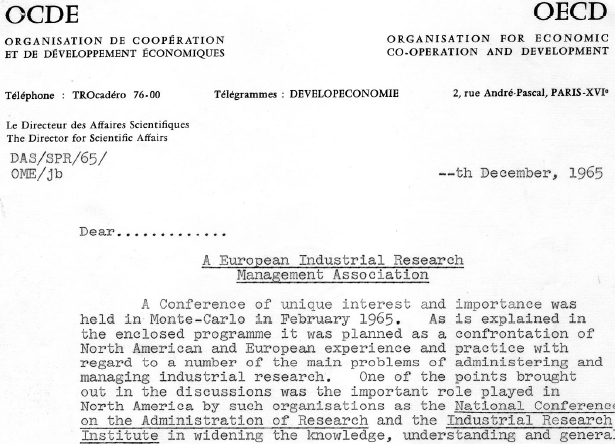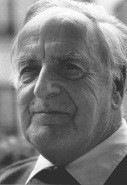ESTABLISHING EIRMA
In 1965, the OECD hosted the European/North American Conference on Research Management. Professor Hendrik Casimir, a member of the Board of Management of Philips, chaired the conference. At the time, Dr King (see below) was Director General for Scientific Affairs at the OECD.
A Body Devoted to Industrial Research Management
The conference organisers focused on the need to discuss "only those problems which concern both top management and research, which can give rise to conflicts and disagreement between these two focal points in the administrative hierarchy of the firm." It concluded with a recommendation to form a European body devoted to industrial research management, similar to the Industrial Research Institute. King and the OECD lent their support to this recommendation. Casimir and King jointly contacted all large firms in Europe, inviting them to join the new association. (Read their letter here)

An Independent Not-For-Profit Organisation Was Born
The following year, EIRMA was born as an independent not-for-profit organisation with 32 members, Professor Casimir as founding President, and an OECD secondee, Owen Etoe, as Secretary-Treasurer. Casimir's personal contribution in establishing a strong Association was considerable. When he stepped down as President four years later, EIRMA had almost 100 members represented by the senior officers responsible for R&D within these companies, and an active and successful programme of activities. Owen Etoe left the secretariat, replaced by Klaus Standke, also from the OECD. The number of members continued to grow, before settling down around 150 by 1975.
Working Groups and Focus Group
An original feature of EIRMA's programme was the Working Group of 15 or so people working together over a period of one to two years to report on a key aspect of R&D management. Early Groups studied questions such as “Research bought outside the Firm,” “Patents,” the “Career of the Research Worker,” the “Use of Computers in R&D,” the “Economic Evaluation of R&D Projects,” “University/Research Relations and Research Buildings.” By now, some seventy such groups have been run. Most recently, a group of younger managers has been looking at Global, Open Innovation, with field trips to India, Poland and Hungary. And the 2nd Focus Group aims to boost understanding of how to manage R&D and innovation as global, increasingly “Open” activities, specifically to address opportunities provided by an emerging economy like Brazil. This helps these people see for themselves how work is handled in different parts of the world, thereby preparing them for their own future responsibilities.
SIR ALEXANDER KING

|
|
The lead in forming EIRMA within the OECD came from Sir Alexander King, who was Director General for Scientific Affairs at OECD. Sir Alex was one of those towering figures of the 20th Century: a scientist, international civil servant and pioneering environmentalist at the forefront of new thinking about the role of science in public policy. In 1968 he co-founded the Club of Rome, a global think-tank concerned with world problems and the future of humanity. Its honorary members included Mikhail Gorbachev, Jimmy Carter and Václac Havel. Richard von Weizsäcker, the former President of Germany, once remarked: “The Club of Rome is the conscience of the world.”
|
In his autobiography, "Let the Cat Turn Round: One Man’s Traverse of the Twentieth Century" (
CPTM, London 2006), after explaining the genesis of EIRMA, King expresses praise for EIRMA: "...Now after about 35 years of useful activity, practically every European firm with research capacity is a member. Not only has EIRMA contributed substantially to the quality of industrial research in Europe, but it has continuously brought the implications of changing political, economic, social and technical conditions to the attention of research leaders. Its discussions between colleagues from competing firms are a prime example of the fertile coexistence, co-operation and competition frequently advocated but seldom achieves."
Sir Alex died in February 2007, and his obituary appeared in the
Spring 2007 edition of eIQ the former EIRMA member magazine.